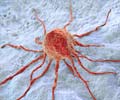Discover how a recent study reveals the potential of eliminating extra chromosomes in cancer cells, inhibiting tumor formation.
- Extra chromosomes are commonly found in cancer cells, but their role in cancer development remained unclear
- Researchers used CRISPR technology to remove entire chromosomes in melanoma, gastric cancer, and ovarian cell lines
- Eliminating aneuploidy compromised cancer cells' ability to form tumors, suggesting an "aneuploidy addiction" in cancer growth
Oncogene-like addiction to aneuploidy in human cancers
Go to source).
Role of Extra Chromosomes in Cancer
Extra chromosomes are an aneuploidy; human cells generally have 23 pairs of chromosomes. "If you look at normal skin or normal lung tissue, for example, 99.9% of the cells will have the right number of chromosomes," said Jason Sheltzer, assistant professor of surgery at Yale School of Medicine and senior author of the study. "But we've known for over 100 years that nearly all cancers are aneuploid." However, it was unclear what role extra chromosomes had in cancer, such as whether they caused or were caused by cancer. "For a long time, we could observe aneuploidy but not manipulate it. We just didn't have the right tools," said Sheltzer, who is also a researcher at Yale Cancer Center. "But in this study, we used the gene-engineering technique CRISPR to develop a new approach to eliminate entire chromosomes from cancer cells, which is an important technical advance. Being able to manipulate aneuploid chromosomes in this way will lead to a greater understanding of how they function."Role of Aneuploidy in Cancer
Former lab members Vishruth Girish, now an M.D.-Ph.D. student at Johns Hopkins School of Medicine, and Asad Lakhani, now a postdoctoral researcher at Cold Spring Harbor Laboratory, co-led the work. The researchers used their newly discovered technique, Restoring Disomy in Aneuploid Cells Using CRISPR Targeting, or ReDACT, to target aneuploidy in melanoma, gastric cancer, and ovarian cell lines. They specifically deleted an abnormal third copy of the long part of chromosome 1 (commonly known as the "q arm"), which is seen in various forms of cancer, is connected to disease progression, and occurs early in cancer development."When we eliminated aneuploidy from the genomes of these cancer cells, it compromised the malignant potential of those cells and they lost their ability to form tumors," said Sheltzer. Based on this finding, the researchers proposed cancer cells may have an "aneuploidy addiction" -- a name referencing earlier research that discovered that eliminating oncogenes, which can turn a cell into a cancer cell, disrupts cancers' tumor-forming abilities. This finding led to a model of cancer growth called "oncogene addiction."
When the researchers looked into how an additional copy of chromosome 1q can promote cancer, they discovered that when numerous genes were overrepresented – because they were encoded on three chromosomes instead of the usual two – they spurred cancer cell proliferation. This upregulation of specific genes also led to a vulnerability that may be exploited to target malignancies with aneuploidy.
Targeting Aneuploidy as a Therapeutic Approach for Cancer
A previous study has demonstrated that a gene called UCK2 on chromosome 1 is essential to activate certain medicines. Because of the overexpression of UCK2, Sheltzer and his colleagues discovered that cells with an additional copy of chromosome 1 were more sensitive to those medications than cells with only two copies. Furthermore, they discovered that the medications might drive cellular evolution away from aneuploidy, resulting in a cell population with normal chromosome numbers and, as a result, less potential to become malignant. When researchers mixed 20% of aneuploid cells with 80% of normal cells, the aneuploid cells took over, accounting for 75% of the mixture after nine days. When the 20% aneuploid combination was subjected to one of the UCK2-dependent medicines, the aneuploid cells were reduced to 4% of the mix nine days later."This told us that aneuploidy can potentially function as a therapeutic target for cancer," said Sheltzer. "Almost all cancers are aneuploid, so if you have some way of selectively targeting those aneuploid cells, that could, theoretically, be a good way to target cancer while having minimal effect on normal, non-cancerous tissue." Before this method can be tried in a clinical study, more research must be conducted. Sheltzer's goal is to transfer this research into animal models, assess more medications and aneuploidies, and collaborate with pharmaceutical companies to progress toward commercial trials.
"We're very interested in clinical translation," said Sheltzer. "So we're thinking about how to expand our discoveries in a therapeutic direction."
Reference:
- Oncogene-like addiction to aneuploidy in human cancers - (https://www.ncbi.nlm.nih.gov/pmc/articles/PMC9882055/)















